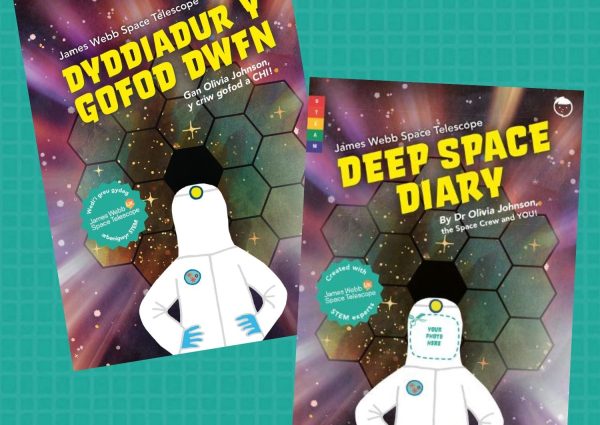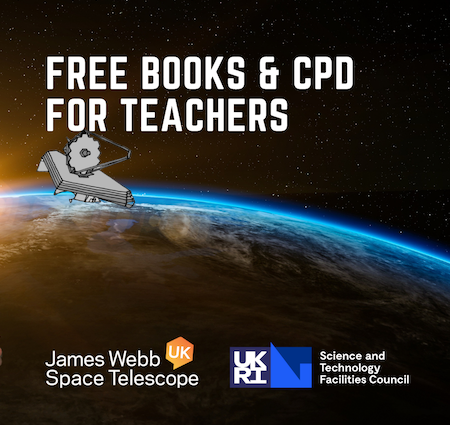This exciting new school project celebrates the UK’s involvement with one of the most globally-anticipated space missions, the James Webb Space Telescope, and will encourage thousands of British students to realise their inner space expert and explore the Universe.
https://youtu.be/fsxrDMSClJI
The Deep Space Diary programme introduces KS2/P5-7 students to astronomy, physics, engineering and space through the story of the James Webb Space Telescope. With the support of the STFC, 15,000 free books will be available to schools across the UK with priority given to those in disadvantaged areas or with high numbers of pupil premium.
The Deep Space Diary is the third book in the series, with the previous two created with the UK Space Agency, author Lucy Hawking and inspired by European Space Agency (ESA) Astronaut Tim Peake’s 2015 Principia mission.
“In 2015 we created the Principia Space Diary to empower younger students to learn about space and science while they followed my mission to the International Space Station. That book, and the subsequent Mars Diary sequel, were a huge success as they tackle a range of challenging subjects in a creative and hands-on way. I’m excited to see the ideas and innovations our young British space experts come up with as they complete this new Deep Space Diary and explore the biggest questions about our Universe.”
ESA Astronaut Tim Peake
I loved creating the original space diary to celebrate Tim Peake’s journey to the ISS. It was a great honour to work with Tim on such an imaginative scientific project which gave primary school students the chance to explore space while learning and having fun. In the follow up Mars Diary, we gave students the huge challenge of planning a mission to the red planet. It has been exciting to launch this series and see how successful it has become. I am sure the Deep Space Diary will continue that success.
Lucy Hawking, author of the Principia Space Diary and Mars Diary
The James Webb Space Telescope (or simply Webb), due to launch in 2021, is the largest space telescope ever built (the size of a tennis court when deployed) and is expected to reveal even more about the Universe than its predecessor, Hubble. Webb is a global project, led by NASA, with some of its key experts in Europe and the UK. The Deep Space Diary makes this incredible human achievement accessible for younger students by delivering complex ideas in creative, student-led ways. The diary was also developed with and features a diverse group of real engineers and astronomers who have worked on Webb or will use it to explore the Universe.
“Celebrating the involvement that the UK has in this revolutionary mission, whilst at the same time giving children an insight in to how exciting being involved in a space science mission can be makes this a very special project; after all they will be the scientists and engineers of the future.”
European Principle Investigator for MIRI Professor Gillian Wright
From today (Thursday 13th June) primary schools in the UK are invited to register at discoverydiaries.org for a chance to receive a free box of 30 Deep Space Diaries plus stickers and a Mission Log poster for their class. Books will be allocated to schools on a first come, first served basis with priority given to those in disadvantaged areas or with a higher percentage of free school meals. Other schools, home educating families and community groups can also register to access the free online programme, or purchase printed diaries via the online bookshop. Books will be delivered in September 2019, at the beginning of the new school year.
Teachers are fully supported with an online portal containing over 60 hours of classroom and home learning activities, differentiated teaching notes, curriculum guides (for England, Wales, Scotland and Northern Ireland), extension activities, multimedia resources and more. The programme also provides cross-curricular links, combining STEM learning with a breadth of other subjects to ensure that every child can find a way in to science and engineering.
“Our goal with the Discovery Diaries is not necessarily to hot-house future STEM experts (though that’s a happy bi-product!) but to encourage every child, regardless of their skills, interests or circumstances, to imagine, create, question, research, visualise, analyse, problem solve and generally “think like a scientist”. These are skills that will help them throughout their lives and the James Webb Space Telescope is the perfect inspiration for all of that.”
Discovery Diaries Publisher, Kristen Harrison
The Deep Space Diary has been developed by Curved House Kids with Dr Olivia Johnson at STFC’s UK Astronomy Technology Centre and Royal Observatory Edinburgh. A skilled team of practising primary teachers have co-written teaching materials and curriculum guides and Professor Peter McOwan at Queen Mary University of London has provided academic advice and feedback on activities.
Notes to Editors
Download photos, logos and Tim Peake video from our Media Kit: https://bit.ly/2WvfMEc
Website: discoverydiaries.org
Registrations open 13th June, 2019 and schools who register before 5th July, 2019 will go into the draw for free copies.
ABOUT THE JAMES WEBB SPACE TELESCOPE AND STFC
UK scientists and engineers are part of a team who built an instrument for the James Webb Space Telescope – the mid-infrared instrument (MIRI), an infrared camera and spectrometer.
MIRI was developed in a collaborative effort between ten European countries, led by the UK and the Jet Propulsion Laboratory (JPL), with the support of ESA and NASA. The UK team is made up of a partnership between the Science and Technology Facilities Council (STFC), University of Leicester and Airbus Defence and Space with funding from the UK Space Agency. The European Principal Investigator (PI) is Prof Gillian Wright who is Director of STFC’s UK Astronomy Technology Centre in Edinburgh.
In addition to MIRI, University College London’s Mullard Space Science Laboratory is contributing NIRSpec’s on board calibration system and ground support equipment, and a Staffordshire-based company, Tekdata Interconnect Systems, provided the JWST cryogenic harness.
For more information visit: https://www.technologysi.stfc.ac.uk/Pages/MIRI.aspx
ABOUT CURVED HOUSE KIDS (www.curvedhousekids.com)
Curved House Kids is an independent publisher specialising in arts-based education for children and young people. Our mission is to ensure that every child, everywhere in the world, is empowered to learn, create and communicate. We enrich education by making challenging subjects – like science and literacy – exciting and accessible. We do this by incorporating the arts into education and by working with like-minded partners who value learning, creativity and innovation. Curved House Kids was founded in 2013 by Kristen Harrison, a former Penguin editor and the co-founder of the Visual Verse online anthology.
FOLLOW THE EXPERTS
JWST: @WebbTelescopeUK
Olivia Johnson: @cocjohnson
Alastair Bruce: @spacedoot
Naomi Rowe-Gurney: @NRoweGurney
Curved House Kids: @curvedhousekids
FOR FURTHER INFORMATION AND ENQUIRIES
Becky Parker-Ellis
STFC Media Officer
Tel: +44(0)1793 444564
Mob: +44(0)7808 879294
becky.parker-ellis@stfc.ac.uk
If you have an urgent out of hours enquiry, please call the duty press officer on 07092 982664
Kristen Harrison (Publisher)
Curved House Kids
Mob +49 1624316736
kristen@thecurvedhouse.com
@curvedhousekids



